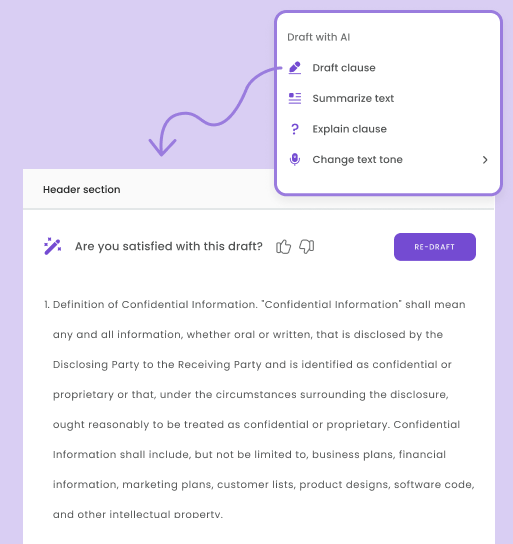Contracts are important but, arguably, contract duration is just as important. No contract can last forever even if they last for years. It’s essential to understand what contract duration is, the different types of contract duration, and how it can impact your ability to create contracts.
In this guide, you’ll learn all about contract duration and how to use it to your advantage. By the time you’re done, you’ll know how long your contracts should be and how to end them the right way.
Basics of Contract Duration
Contract duration refers to the length of time during which a contract is valid and enforceable. It defines the period within which the parties’ rights, obligations, and provisions specified in the contract are applicable.
Understanding the basics of contract duration is important for managing contractual relationships and planning business activities. Without knowing the duration of a contract, you won’t be able to set appropriate milestones. Even if the contract is meant to run indefinitely, you can include durations for specific phases.
The definition of contract duration can vary depending on the nature of the agreement and the intentions of the parties. It can be explicitly stated within the contract, mentioning specific dates or a defined period, such as “one year” or “three months.”
In other cases, the contract duration may be implied based on the nature of the agreement or industry practices.
The determination of contract length is an important consideration during contract negotiation and drafting. The duration should align with your expectations and the nature of the relationship established by the contract.
Consider factors such as the type of services or goods being provided, the industry norms, potential project timelines, and your long-term objectives.
For example, if it’s a supply contract and you provide net 60-day terms, you may want to push for a longer contract duration. This will secure a long term stream of income for you and make the 60 day payment terms more palatable.
Different types of contract durations
There are multiple types of contract durations that you can choose based on their specific needs and circumstances. The most common types include the following:
- Fixed-Term Contracts: A fixed-term contract has a predetermined duration specified in the agreement. It begins on a specific start date and ends on a specific end date. This type of contract provides clarity and certainty regarding the duration of the contractual relationship. You’re obligated to fulfill your contractual obligations within the defined time frame, and the contract terminates automatically at the end of the agreed-upon term.
- Indefinite-Term Contracts: An indefinite-term contract does not have a specific end date specified in the agreement. Instead, it continues until one of the parties decides to terminate it by providing notice as outlined in the contract terms or as required by applicable laws. Indefinite-term contracts offer flexibility and allow you to maintain the contractual relationship for an extended period without being bound by a fixed time frame.
- Renewal or Extension Clauses: Contracts may include provisions for renewal or extension. These clauses provide an option to continue the contractual relationship beyond the initial term. They typically specify the conditions under which the contract can be renewed or extended, such as giving notice within a certain timeframe or agreeing upon revised terms. Renewal or extension clauses allow you to continue the relationship without having to negotiate an entirely new contract.
- Rolling Contracts: A rolling contract is a type of contract that automatically renews for a specified term unless one of the parties gives notice to terminate it. The contract continues for successive periods, often of the same duration, until one of the parties provides notice as stipulated in the contract. Rolling contracts provide ongoing commitment while allowing for flexibility and ease of continuation.
- Specific Project or Milestone-Based Contracts: Some contracts have a duration based on the completion of a specific project or the achievement of certain milestones. These contracts define the scope of work and the timeframe within which the project or milestones must be completed. Once the project is finished or the milestones are achieved, the contract naturally comes to an end.
- Termination Clauses: Contracts may also include termination clauses that allow you to end the contract before the agreed-upon duration. These clauses specify the conditions under which either party can terminate the contract, such as a material breach of contract, non-performance, or change in circumstances. Termination clauses provide an avenue to dissolve the contract if certain predefined conditions or events occur.
Keep in mind that multiple types of contract durations can be included in a single contract. For example, A fixed term contract can be combined with renewal clauses and termination clauses.
Key Considerations in Determining Contract Duration
When determining the contract duration, there are several important considerations to keep in mind. These considerations help ensure that the chosen duration aligns with the needs and objectives of the parties involved. The most crucial considerations include:
- Clarity of Purpose and Objectives: Clearly understanding the purpose and objectives of the agreement is essential. Determine whether the contract is for a specific project, an ongoing business relationship, or a one-time transaction. This clarity will help guide the determination of appropriate contract time frame.
- Scope of Work and Deliverables: Evaluate the complexity and scope of the work or deliverables outlined in the agreement. Consider the time required to complete the tasks satisfactorily, including any potential contingencies or unexpected delays.
- Project Timelines and Milestones: If the contract is project-based, identify the critical milestones and estimated project timelines. Align the contract duration with the projected timeframe for completing the project or achieving specific milestones.
- Risk Assessment: Assess the risks associated with the agreement. Consider factors such as market volatility, regulatory changes, and external dependencies. Determine whether a shorter or longer contract duration would help mitigate these risks effectively.
- Flexibility and Adaptability: Evaluate the need for flexibility and adaptability within the contract. Determine whether the agreement may require periodic reassessment, adjustment, or termination based on changing circumstances. Choose a contract duration that allows for necessary flexibility without compromising stability.
- Legal and Regulatory Requirements: Take into account any legal or regulatory requirements that govern contract durations for the specific type of agreement or jurisdiction involved. Ensure compliance with applicable laws and regulations to avoid any legal issues.
By carefully considering these factors, you can determine an appropriate contract duration that supports your objectives, minimizes risks, and fosters a successful and sustainable contractual relationship.Top of Form
Managing Contract Duration
Managing contract duration involves actively overseeing and addressing the various aspects of the contract’s timeframe to ensure that the agreement remains effective and aligns with your objectives. Here are some key considerations for managing contract duration effectively:
- Regular Monitoring: Actively monitor the contract’s duration to stay informed about important dates, milestones, and obligations. Establish a system for tracking key dates, such as renewal or termination deadlines, and set reminders to prompt timely action.
- Communication and Collaboration: Foster open and effective communication throughout the contract duration. Regularly engage in discussions to ensure that everyone is aware of any changes, challenges, or opportunities that may impact the contract’s effectiveness or require adjustments.
- Performance and Compliance: Monitor and assess performance and compliance with the contract’s terms and conditions. Address any issues or breaches promptly to avoid further complications. Regularly evaluate and document adherence to contractual obligations.
- Change Management: Contracts may need to be adjusted or modified within their duration due to changing circumstances or evolving needs. Establish a process for managing changes to the contract, including formal amendment procedures or change control mechanisms. This ensures that modifications are properly documented and agreed upon by everyone.
- Renewal or Termination Planning: As the contract nears its expiration, evaluate the need for renewal or termination. Engage in renewal discussions well in advance to allow sufficient time for negotiation, assessment of performance, and consideration of any updated requirements. If termination is necessary, follow the contractual provisions and any applicable legal obligations.
- Risk Management: Continually assess and manage risks associated with the contract throughout its duration. Identify potential risks and establish mitigation strategies to minimize their impact. Regularly review and update risk management plans to adapt to changing circumstances.
- Record-Keeping and Documentation: Maintain accurate and up-to-date records of all contract-related communications, changes, and performance evaluations. Proper documentation serves as evidence of your intentions, actions, and compliance, which can be valuable in the event of disputes or future reference.
- Legal and Regulatory Compliance: Ensure ongoing compliance with applicable laws, regulations, and industry standards throughout the contract duration. Stay informed about any changes in relevant laws or regulations that may impact the contract and take necessary actions to maintain compliance.
By actively managing contract duration and addressing these considerations, you can navigate the contractual relationship effectively, maximize value, minimize risks, and ensure that the contract remains aligned with your objectives and evolving needs.
Common Challenges and Pitfalls
While managing contract duration is important, there are several common challenges and pitfalls that you may encounter. Being aware of these challenges can help you proactively address them and mitigate potential risks. Here are some common challenges and pitfalls associated with contract duration:
- Inadequate Planning: Insufficient planning regarding contract duration can lead to unforeseen challenges. Parties may underestimate the time required to complete tasks, resulting in delays or incomplete deliverables. It’s crucial to conduct thorough planning and consider various factors when determining the appropriate contract duration.
- Ambiguous or Vague Terms: Poorly defined contract terms can create ambiguity regarding the duration. Lack of clarity can lead to disputes and disagreements over the start and end dates, renewal options, or termination procedures. Ensure that contract terms related to duration are clearly and precisely stated to avoid misunderstandings.
- Changing Business Needs: Business needs and circumstances can evolve during the contract duration. You may encounter challenges if the contract does not sufficiently account for these changes. It’s important to periodically reassess and align the contract duration with evolving business needs to avoid potential conflicts or inefficiencies.
- Failure to Review and Renew: You may fail to proactively review and renew contracts upon expiration. This can result in unintended lapses in the contractual relationship, creating uncertainty and potential disruptions. Regularly review contract expiration dates and engage in renewal discussions well in advance to ensure continuity.
- Overly Long or Short Durations: Choosing an excessively long or short contract duration can create challenges. Very long contracts may hinder flexibility and make it difficult to adapt to changing business dynamics. Extremely short durations may lead to frequent contract renegotiations or insufficient time to achieve desired outcomes. Strive to strike the right balance when determining contract duration.
- Inadequate Termination Clauses: Contracts lacking clear termination clauses may create difficulties when parties wish to end the agreement before the agreed-upon duration. Without proper provisions, termination can become complex and lead to disputes. Include well-defined termination clauses that specify the conditions and procedures for ending the contract.
- Regulatory and Legal Changes: Regulatory or legal changes during the contract duration can impact its effectiveness. New laws, regulations, or industry standards may require modifications or updates to the contract. Parties must stay informed about relevant changes and be prepared to adapt the contract to remain compliant.
By being mindful of these challenges and pitfalls, parties can take proactive measures to address them and manage the contract duration effectively. Careful planning, clear communication, periodic reviews, and flexibility are key to navigating these challenges and ensuring successful contract management.Top of Form
Conclusion
Oftentimes, contract duration is something that’s done in an offhand manner without taking into consideration all the relevant factors. It’s important to keep in mind the different types of contract duration and how to manage it effectively.
If you can internalize these aspects then you’re well on your way to creating contracts that favor instead of hinder you.
If you have any questions, be sure to let me know in the comments, and don’t forget to share.




